Research - (2020) Advances in Dental Surgery
Covid-19: As a factor of Quarantine Measures Implementation in Russia
Irina A Akhmadullina1*, Elena N Klochko2, Sardaana A Lukina3, Albina A Akhmadullina4 and Venera SH Yusupova5
*Correspondence: Irina A Akhmadullina, Kaza Federal University, Russia, Email:
Abstract
This article serves as an introduction to the problem of the self-isolation regime compliance during COVID-19, adopted by the Government of the Russian Federation. Much attention is given to the analyzing of the population opinion about quarantine measures connected with COVID-19. The research method was a population survey. The results show the dynamics of people's attitudes towards quarantine measures compliance. The following conclusions are drawn on the base of a study of the population opinion on the introduction of quarantine measures in connection during the new coronavirus infection. It has been found that 76.7% of respondents consider it reasonable to introduce self-isolation in connection with COVID-19. However, 21.7% of respondents disagree with the lawfulness of the introduced measures. Due to the mass media, the population adhered to the recommendations on observing the mask and glove regime and self-isolation in the amount of 88.3% of the respondents. For various reasons, not all citizens observed the self-isolation regime for a long time, as evidenced by the results: 40% - observed the self-isolation regime for the entire period, 51.7% - partially (only in public places), 8.3% - did not comply at all. At this time, only 68.3% of the respondents observe the regime in public places, and 31.7% do not consider it necessary. 56.7% of the respondents support the need to continue observing the mask and glove regime in public places. Most of all, the author was interested in the question of what motivated people to comply with quarantine measures. It turned out that almost half of the respondents were afraid of real infection (48.3%), a third of them were afraid of criminal and administrative liability (33.3%), a fifth of the population was under the influence of media propaganda (18.3%).
Summing up the results, it can be concluded that since the beginning of the measures adoption by the Government of the Russian Federation to prevent the spread of the new coronavirus infection, the majority of the surveyed population considered it necessary to observe self-isolation, using masks and gloves. Most of them believe that the measures taken by the Government were legitimate at the beginning of the quarantine, but the fact that now these measures are unnecessary opinions are divided approximately equally. In the first months of isolation, citizens were driven by the threat of a real infection with a new coronavirus infection. Part of the population was afraid of administrative and criminal liability for not observing quarantine measures.
Keywords
Quarantine, Self-isolation regime, COVID-19, Population survey, Population's attitude to the mask regime
Introduction
Today, self-isolation in Russia has been going on for four months. The media (television, radio, newspapers, the Internet) talk and write a lot about the need for quarantine measures and self-isolation. There are also opinions of the population about the termination of these measures. In this regard, the author decided to conduct a survey of the population in the city of Naberezhnye Chelny and, with the help of the survey, to find out what the residents of Chelny think about this.
The author draws attention to the necessity of the use of masks and gloves in public places connected with the dynamics of compliance of the self-isolation regime during COVID-19 and the measures taken by the Government of the Russian Federation. For this purpose, a questionnaire was created, in which the questions about the legality of the introduction of quarantine measures, the need to comply with them in the opinion of the population, the desire to continue using masks and gloves in public places, as well as the motivation of citizens to comply with quarantine were considered.
As we know, quarantine is a type of restrictive measures that are introduced at checkpoints across the State border of the Russian Federation, on the territory of the Russian Federation, the territory of the corresponding constituent entity of the Russian Federation, a municipal formation, in organizations and at objects of economic and other activities in the event of a threat of emergence and spread infectious diseases (Russian Federation: State Duma. Council of the Federation, 2003).
There is an opinion among the population that quarantine was an unnecessary measure, and that the new coronavirus infection does not pose such a pronounced danger and is equated to ordinary flu. Therefore, there is no need to comply with the self-isolation regime.
According to official data, as of August 7, 2020, the number of cases in the Russian Federation amounted to 877,775 people, and 14,756 died (Figure 1). The growth was 5372 for the infected and 118 for the deaths per day. In the Republic of Tatarstan, the number of people infected with a new coronavirus infection amounted to 5810 people, 27 died. For example, in the world as of August 7, 2020, the number of infected people was 1,9288,069 people, and 719,096 people died (Figure 2) [1].
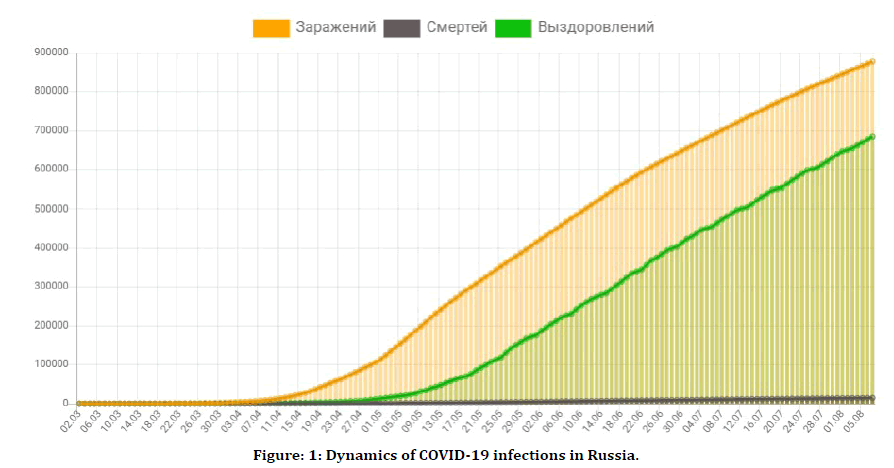
Figure 1. Dynamics of COVID-19 infections in Russia.
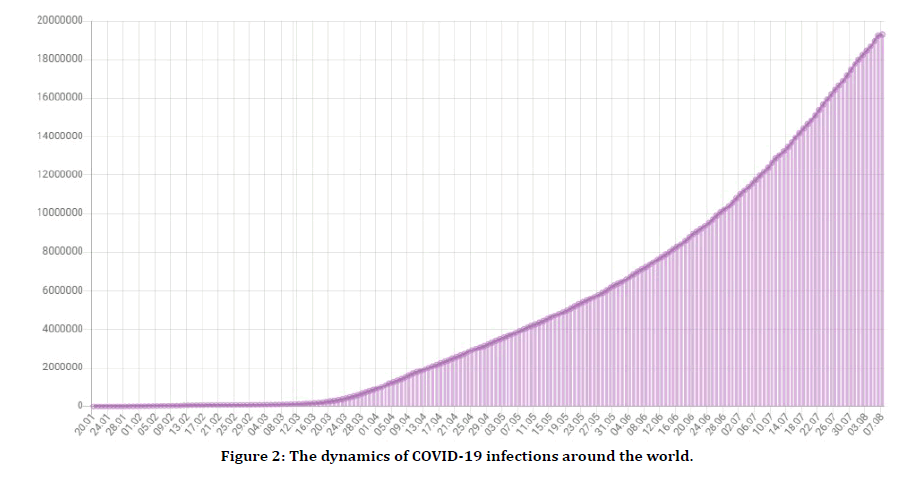
Figure 2. The dynamics of COVID-19 infections around the world.
At the time of the introduction of self-isolation in our country, the number of cases was much less, but their number was rapidly increasing from day to day. Therefore, the Government introduced a self-isolation regime.
A self-isolation is a set of restrictive measures for the population, introduced by the Government of the Russian Federation for a certain period of time to combat the spread of a dangerous disease. Self-isolation is not a legal concept and does not have limiting regulations. Selfisolation is a recommendation based on the wishes of the population. Citizens are asked to observe the regime of self-isolation, for example, not to go outside without special need, to limit contact with other people and to comply with all recommendations for the prevention of viral diseases (wearing masks and gloves in public places, frequent and prolonged hand washing, surface treatment, etc.), proposed by the medical community.
The main difference between the regime of self-isolation and quarantine is that there are penalties for non-compliance with quarantine measures (forced isolation, a fine, prosecution of Articles 236 and 237 of the Criminal Code of the Russian Federation), and the absence of punishment for violating the regime of selfisolation.
It should be noted that the self-isolation regime was introduced in Moscow by the decree of the Mayor of the city of Moscow dated March 29, 2020 No. 34-UM.
The main regulations on the new coronavirus infection, which included in the list of diseases that pose a danger to others were considered Initially, a high alert regime was introduced in the constituent entities of the Russian Federation and the recognition of a force majeure situation in the country due to the spread of COVID-19 (Law, 1994) [2,3]. In March, the main tasks of the Council and the Coordination Center were developed to prevent the spread of the new coronavirus infection [4]. Additionally, funds were allocated from the reserve fund in the amount of 1.4 billion rubles for the development of means of prevention and diagnosis of COVID-19 (24.04.2020 № 1131-р) [5,6]. In connection with the increase in the number of cases diagnosed with COVID-19, measures were taken to re-profile medical organizations to provide care for patients diagnosed with a new coronavirus infection. Also, measures were taken to restrict movement and introduce access control in the constituent entities of the Russian Federation [7]. In a number of subjects of the Russian Federation, additional measures of administrative responsibility have been introduced for violation of the established restrictions. Administrative liability is provided for violations in the field of ensuring the sanitary and epidemiological well-being of the population, including for violation of sanitary norms and rules during an emergency or quarantine regime, including those that caused harm to human health or death. In connection with the spread of false information on the Internet, administrative responsibility was introduced for the dissemination of deliberately inaccurate information in the media and the Internet about circumstances posing a threat to the life and safety of citizens, about measures taken to ensure security, methods and methods of protection [8]. As we can see, the Government has done a lot to limit the spread of infection on the territory of the Russian Federation.
Today, there are two opposite views on this problem. Part of the population considers it necessary to extend the quarantine measures in connection with COVID-19, others are of the opinion about the termination of quarantine measures. In this connection, the questionnaire was developed.
For this period of time, there are works devoted to the spread of a new coronavirus infection. However, the author decided to study this topic on the example of his questionnaire and this is the novelty of this study.
In confirmation of the relevance of the work, the results of the survey laid down, where it turned out that most of the population is ready to continue the implementation of quarantine measures, since they really understand the threat of a new coronavirus infection, despite the official statistics.
Methodology
Survey method was used, used to compile static statistical representations of the state of society, public opinion about quarantine measures related to COVID-19, in order to predict events. With the growing popularity of the Internet, online surveys are becoming a convenient way to collect data. The survey was conducted anonymously, in absentia, with questionnaires sent by e-mail.
We conducted a survey in July 2020 in the city of Naberezhnye Chelny, people of different ages and professions participated in the survey. The survey was anonymous. The purpose of the survey is to analyze the attitude of the population towards the self-isolation regime in connection with COVID-19.
The survey involved 60 people, of whom 35 were women (58.3%) and 25 men (41.7%) (Figure 3), with a predominance of the age group under 30 (Figure 4).
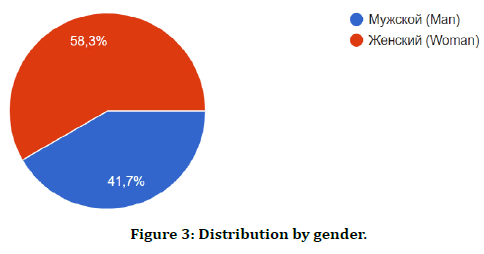
Figure 3. Distribution by gender.
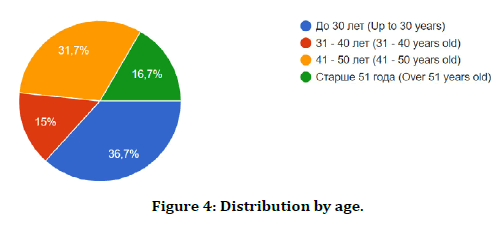
Figure 4. Distribution by age.
To the question "Do you think self-isolation was necessary due to COVID-19," 46 people answered positively (76.7%), 9 - negatively (15%) and 5-doubted the answer (8.3%) (Figure 5).
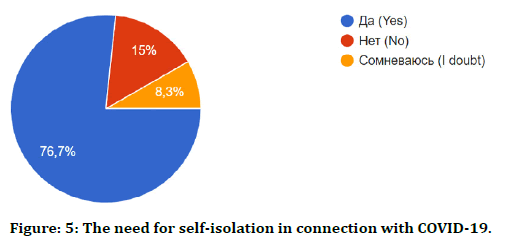
Figure 5. The need for self-isolation in connection with COVID-19.
To the question “In your opinion, was the introduction of self-isolation in connection with the new coronavirus infection legitimate?” 25 people answered “yes” (41.7%), 22-“rather yes” (36.7%), 10-“rather no "(16.7%), 3-" no "(5%) (Figure 6).
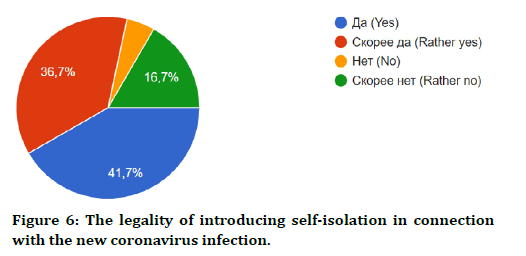
Figure 6. The legality of introducing self-isolation in connection with the new coronavirus infection.
We were interested in the question “Did you observe the self-isolation regime in accordance with the regulations adopted by the Government of the Russian Federation?” 53 people answered positively (88.3%), 7 - negatively (14%) (Figure 7).
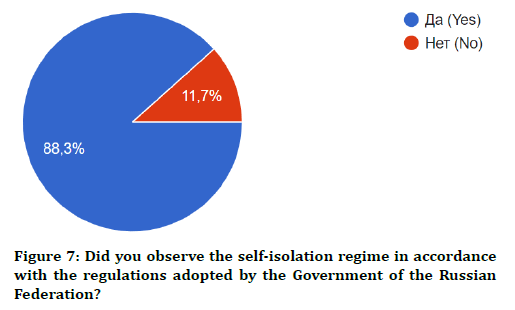
Figure 7. Did you observe the self-isolation regime in accordance with the regulations adopted by the Government of the Russian Federation?
To the question “Do you observe the mask and glove regime in public places” 41 people answered positively (68.3%), 19 - negatively (31.9%) (Figure 8).
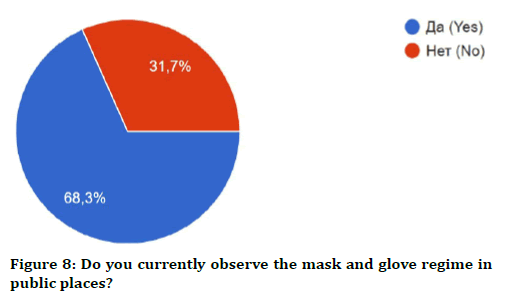
Figure 8. Do you currently observe the mask and glove regime in public places?
Also, we were interested in the question “Do you think it is necessary to continue observing the mask and glove regime in public places?” 34 people answered positively (56.7%), 26 - negatively (43.3%) (Figure 9).
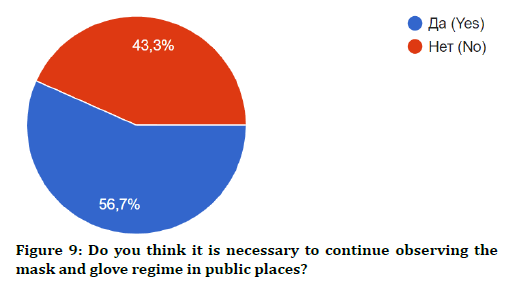
Figure 9. Do you think it is necessary to continue observing the mask and glove regime in public places?
To the question "What motivated you to comply with quarantine measures?" 29 respondents are afraid of real infection (48.3%), 20 of criminal, administrative liability (33.3%), 11-media propaganda (18.3%) (Figure 10).
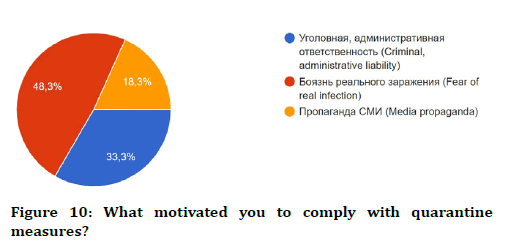
Figure 10. What motivated you to comply with quarantine measures?
Results and Discussion
The goal set by the author was achieved, the attitude of the population to the self-isolation regime in connection with COVID-19 was analyzed. At the beginning of the quarantine, people did not have a complete idea of the danger of a new coronavirus infection, as a result, they did not adhere to quarantine measures, they were restrained only by administrative and criminal liability for not observing quarantine. Over time, the townspeople were infected among colleagues, relatives and friends, which led to what became an incentive for finding a home, handling hands, wearing masks and gloves, keeping distance and all other measures recommended by WHO. Part of the population began to actively listen to the news bulletin about those infected and killed by COVID-19, which also contributed to the implementation of quarantine measures.
Since the population expected that the quarantine measures would not last long, the restrictions would be lifted in the near future, but this did not happen. People continued to return home from the outbreaks of the pandemic, thereby further contributing to the spread of the infection.
Prolonged restrictive measures have made the population tired of isolation and stopped using personal protective equipment. In addition, the Government has decided to ease restrictions related to COVID-19. It is allowed to hold leisure, entertainment and outdoor sports events (no more than 50 participants). Fitness centers, shopping centers, cafes, restaurants and markets have been opened, with a prerequisite for meeting the requirements of sanitary and epidemiological safety [9]. The population reacted in a peculiar way in response to the softening of restrictive measures, many refused to wear masks and gloves in public places. The result, which is confirmed by a survey of the population. Anna Yusupova, a leading researcher at the Laboratory of Social and Cognitive Psychology at the Institute of Biomedical Problems of the Russian Academy of Sciences, explained the unwillingness of Russians to wear protective equipment in public places. In her opinion, this is an attempt to cope with anxiety. Denial is one of the most common reactions to anxiety, she says. Yusupova believes that such people do not solve the problem with their own anxiety, and they also complicate the epidemiological situation. She noted that another reason for this behavior may be mistrust of official information [10].
Residents of the Republic of Tatarstan are accustomed to using personal protective equipment in public places. As Marina Trofimova, Deputy Head of Rospotrebnadzor in the Republic of Tatarstan, noted during a press conference, “in our opinion, we initially had quite strict control in the republic. Therefore, communicating with colleagues from other subjects, we understand that in our republic the population is accustomed to wearing masks and gloves where necessary. And, moreover, people, taking care of their health and the health of their loved ones, and in other places use masks and gloves” [11].
The police exerted a great influence on the non-spread of coronavirus infection. Ministry of Internal Affairs officers not only monitored citizens' compliance with security measures and self-isolation regimes, but actively conducted explanatory work, used a memo on how to prevent coronavirus infection among foreign citizens in the Russian Federation [12]. Everyone knows that in our country, the police maintain thorough control in public places, shops and transport. As can be seen from the survey of the population of the city of Naberezhnye Chelny, tough police measures made sense, since 33.3% of respondents complied with restrictive measures, fearing punishment.
Conclusion
Thus, even though in everyday life we hear a lot of expressions about the abolition of self-isolation, the findings of the survey indicate the opposite. According to the surveyed population, the majority agree with the need and legitimacy of introducing a self-isolation regime in connection with COVID-19. Despite everything, most of them followed the quarantine. Slightly more than half of the respondents consider it necessary to continue observing it. The motivation for compliance with quarantine measures was the presence of administrative and criminal liability, and not just a real threat of infection. Consequently, as much as we would like to get rid of quarantine measures, the existing experience shows that it is thanks to tough restrictions that we can mitigate the second wave of the COVID-19 epidemic.
References
- https://coronavirus-monitor.ru/
- On the protection of the population and territories from natural and man-made emergencies: Federal Law of 21.12.1994 No. 68-FZ. Collected Legislation of the Russian Federation. 1994-No.35-Art. 3648.
- Decree of the Government of the Russian Federation of January 31, 2020 No. 66 "On amendments to the list of diseases that pose a danger to others" Collected Legislation of the Russian Federation 2020-No.6-Art. 674.
- Resolution of the Government of the Russian Federation of March 14, 2020 No. 285 "On the Coordination Council under the Government of the Russian Federation to combat the spread of a new coronavirus infection in the Russian Federation" Collected Legislation of the Russian Federation 2020-No.12-Art. 1781.
- Order of the Government of the Russian Federation of March 25, 2020 No. 723-r "On the allocation of funds from the reserve fund of the Government of Russia for the development of means for the prevention and diagnosis of new coronavirus infection" Collected Legislation of the Russian Federation 2020-No.13-Art. 1994.
- Order of the Government of the Russian Federation of 24.04.2020 No. 1131-r (as amended on 20.06.2020) "On approval of the preliminary list of medical organizations that are re-profiled to provide medical care to patients with a confirmed diagnosis of a new coronavirus infection COVID-19 or suspected of a new one. coronavirus infection COVID-19 in stationary conditions by special instruction” Collected Legislation of the Russian Federation 2020-No.18-Art. 2947.
- Decree of the President of the Russian Federation of 02.04.2020 No. 239 "On measures to ensure the sanitary and epidemiological well-being of the population on the territory of the Russian Federation in connection with the spread of a new coronavirus infection (COVID-19)" Collected Legislation of the Russian Federation 06.04.2020 No. 14 (part 1) Art 2082.
- On amendments to the Code of Administrative Offenses of the Russian Federation: Federal Law dated 01.04.2020 No. 99-FZ. Collected Legislation of the Russian Federation 2020-No.14 (part 1)-Art. 2029.
- On the sanitary and epidemiological welfare of the population: Federal Law of March 30, 1999 No. 52-FZ as amended by from 26.07.2019. Collected Legislation of the Russian Federation. 1999-No. 14-Art. 31.
- http://www.riafan.ru
- https://www.busness-gazeta.ru/
- https: //www.mvd.rf.ru
Author Info
Irina A Akhmadullina1*, Elena N Klochko2, Sardaana A Lukina3, Albina A Akhmadullina4 and Venera SH Yusupova5
1Kaza Federal University, Russia2Kuban State Agrarian University named after I.T. Trubilin, Russia
3North-Eastern Federal University, NEFU, Russia
4Kazan State Medical University, Russia
5Kazan Innovative University named after V.G. Timiryasova (IEUP), Russia
Citation: Irina A Akhmadullina, Elena N Klochko, Sardaana A Lukina, Aleksandr A Korostelev, Venera SH Yusupova, Pandemic Covid-19â??As a factor of Quarantine Measures Implementation in Russia, J Res Med Dent Sci, 2020, 8 (7): 160-165.
Received: 15-Nov-2020 Accepted: 18-Dec-2020
